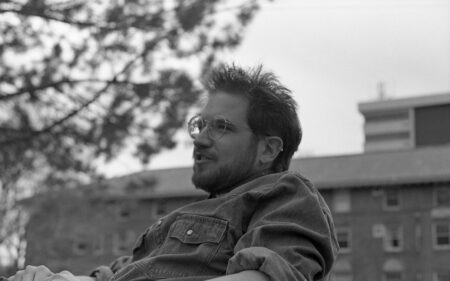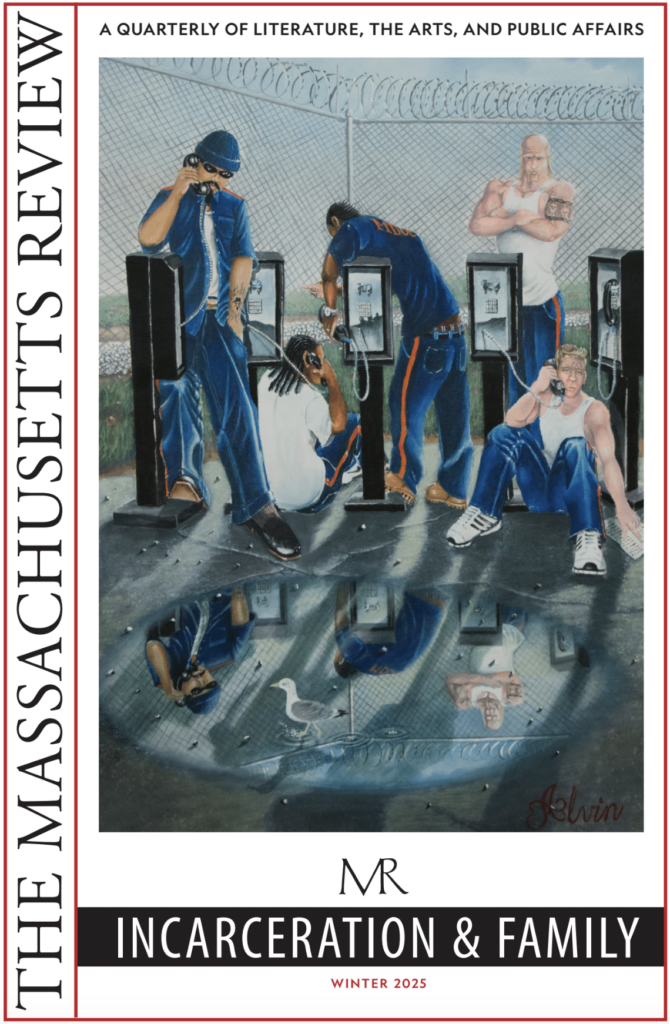10 Questions for Mark Spero

It is cold, our voices carry like storks
and the bonfire clashes with the stars.
—from “Elegy at an Imminent End,” Volume 66, Issue 1 (Spring 2025)
Tell us about one of the first pieces you wrote.
I think my writing moved from random notebook rants to something more formal during my senior year of college. I was tired of my drive to write cryptic, sad, angry, and self-obsessed poems about romantic relationships, which were really just about me, so I started writing about my friends. One was about bike rides we would take around Iowa cornfields, and it celebrated powerful, youthful connections with friends and nature. I remember looking at the finished poem and realizing I had found ways to sync the language, the form, and the content, something I had never really achieved before.
I wrote my first poem, however, when I was three. It reads “Roses are red/ violets are blue/ I have a pineapple stuck in my head.” I am convinced it was my subconscious attempting to make sense of my mental illness, and that it is the best thing I have ever written.
What writer(s) or works have influenced the way you write now?
I don’t know if this question ever gets easier, but for now I find it hard to answer with anything except a scattershot of authors. John Berryman and CD Wright have both been influential for their formal mastery and their wild, fun, musical language. Roland Barthes, Claudia Rankine, Anne Garréta, and Samuel Beckett have expanded my view of what writing can do. I return to Yousef Komunyakaa, Gwendolyn Brooks, and Toni Morrison for a musicality that pairs perfectly with their political and philosophical investigations. Italo Calvino, Cervantes, and Homer have driven my interest in the oddities of storytelling and the endless complexities of myths.
What other professions have you worked in?
I have had many jobs, but I am not sure they were professions. I’ve been a furniture mover, I have loaded vegetables at 5am for a farmers market, I was an usher at a theater, I wrote articles about small Montana towns for a blog, and I was the event producer for a bookstore and private library, just to name a few. Most of my work has been in the music industry, as a tour manager, concert producer, and doorperson at a few different clubs (shout out Elsewhere in New York). I have also worked for some management and talent agencies, as an assistant tour manager, and doing various other odd jobs for musicians. I loved the idea of creating life-changing experiences for people through interactions with music, building a space that people could not only enjoy, but also made them feel like they were part of something important. Working in and around music felt varied and valuable, and I liked that I was helping people have meaningful experiences with art.
What inspired you to write this piece?
I was in Montana in graduate school during the first pandemic winter, and it was too cold to spend much time outside, so I spent most of my time alone. I was lonely, not seeing friends or going on dates, experiencing a very real version of the separateness and isolation I had felt for a lot of my life. A few of my friends started having campfires in the Lolo National Forest so we could all see each other safely. Those fires were full of joy and connection, but also reminders of how disconnected I felt most of the time. This poem started with the strangeness of those campfires. I wanted a form that fit this leaping between two poles of emotions. The broken lines within a boxed container, and the faltering but intense rhythms of those lines, helped me recreate the longing I wanted to better understand.
Is there any specific music that aids you through the writing or editing process?
I have a playlist for writing and editing called “For Writing,” which I continue to expand. It is all movie soundtracks or ambient music or experimental music or anything without words. Some of the artists on the playlist are Beach House, Rachmaninoff, Julianna Barwick, Cosmo Sheldrake, Debussy, Ben Seretan, and Jonny Greenwood.
Do you have any rituals or traditions that you do in order to write?
I have always wanted rituals that take me out of my daily mind and into a more artistic space, but I don’t really have any. I can easily lose track of time, so I use a stopwatch to remind myself how much, or how little, time I have spent writing. The quiet clicking of the watch feels propulsive: a beginning and a rhythm for working. I like writing in the morning. I like pens that make scratchy noises because it sounds like I am doing something. I like coffee. I like my psychiatric medication.
Who typically gets the first read of your work?
My partner is usually my first reader. They are a journalist and podcast producer, so they provide wonderful feedback from a very different writing perspective. I have also been lucky enough to continue working with friends I made during my MFA program, and through conferences and workshops. I send my work to different friends, depending on what I am working on or who has more time. I also continue to send my work to my childhood friends, who are not writers but are brilliant and kind readers, musicians, and artists.
Plus, they know me better than anyone.
If you could work in another art form what would it be?
Music, specifically songwriting and producing. I play music, but I am not very good nor very dedicated to getting better. Music may be the perfect artistic medium because of the way it blends semantic and nonlinguistic expression, touching on so many parts of our brains. My love of music drives my love of the musicality of writing.
What are you working on currently?
Finding a job that has health insurance is one of my main projects. But I have a residency at the Vermont Studio Center this year, where I am hoping to finish my full-length manuscript and edit a chapbook of micro-story-poem-things, along with maybe beginning to write a really bad novel inspired by Don Quixote, because that sounds like fun.
What are you reading right now?
I just started reading Christina Sharpe’s Ordinary Notes, which is stunning. I have also been rereading Kelan Nee’s and Armen Davoudian’s recent debut collections, both of which are incredible.
Mark Spero (they/he) is a poet and essayist. They received the 2021 Madeline DeFrees Prize, selected by Phillip B. Williams, from the Academy of American Poets, and have received support from the Bread Loaf Writers’ Conference, the Community of Writers, the Vermont Studio Center, and the Minnesota Northwoods Writers Conference. Mark was a finalist for the 2023 Prufer Prize and won the 2024 Robert Watson Literary Prize. Their work can be found or is forthcoming in The Greensboro Review, Poetry Northwest, Pleiades, The Cortland Review, and elsewhere.



